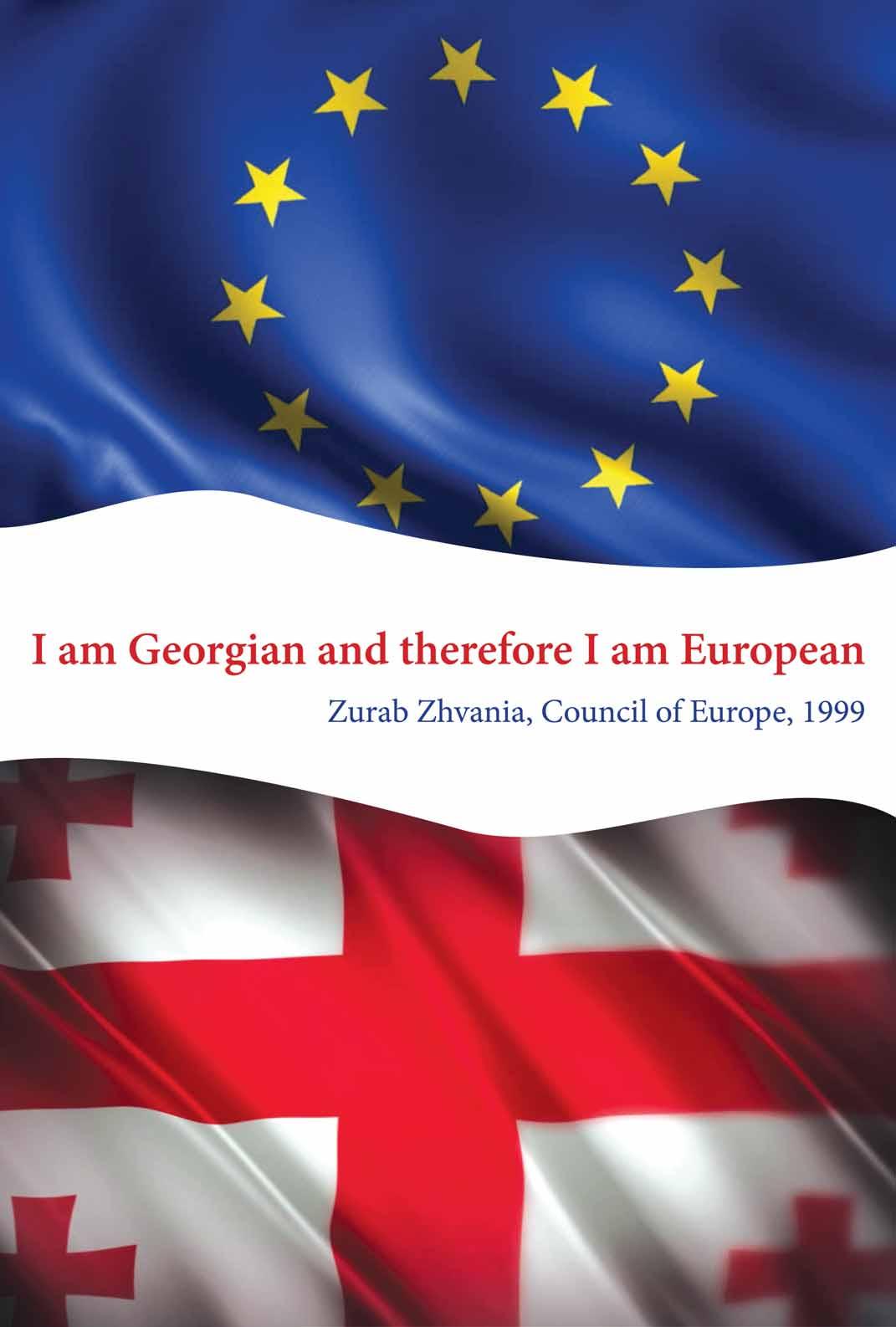FOCUS
ON SANCTIONING GD
Ambassador


ON SANCTIONING GD
Ambassador

If
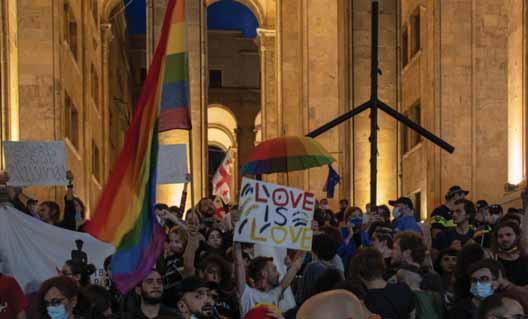
week’s
Celebrating World Environment Day 2024: UNDP and Its Commitment to Georgia’s Environmental and Energy Sustainability
PAGE 2
The Political in Art: "Musicians for a European Future" Concert as a Catalyst for Unity
UNDP Georgia: Thirty-Nine Refugee Entrepreneurs, Primarily from Ukraine, Established Businesses in Georgia
Former Bolshoi Ballerina Nina Ananiashvili to Host Fifth Tbilisi Ballet Festival
Fists and Spirits - Maikunst Festival of Georgian Artists in Berlin
PAGE 4 CULTURE PAGE 10
Yuri Mechitov – Grandmaster of Fine Art Photography
CULTURE PAGE 11
On World Environment Day
2024, the UNDP celebrated its ongoing work in Georgia with regards environmental preservation and sustainable energy solutions.
Georgia boasts 100 protected areas which cover 13% of its land, where forests flourish across 75% of these natural havens. Within these biodiverse zones thrive over 3,000 plant species, including 300 that are found nowhere else but in the Caucasus and Georgia. These protected areas are vital habitats for 90 rare and endangered animals, accounting for 67% of Georgia's Red List species, and provide safe refuge for 27 bird species on the brink of extinction.
However, despite these efforts, 60% of Georgia's land remains vulnerable to climate-related disasters. To combat this, UNDP Georgia, in collaboration with local and global partners, leads the charge in biodiversity conservation. Their efforts range from fortifying protected areas to promoting sustainable community growth and advocating for
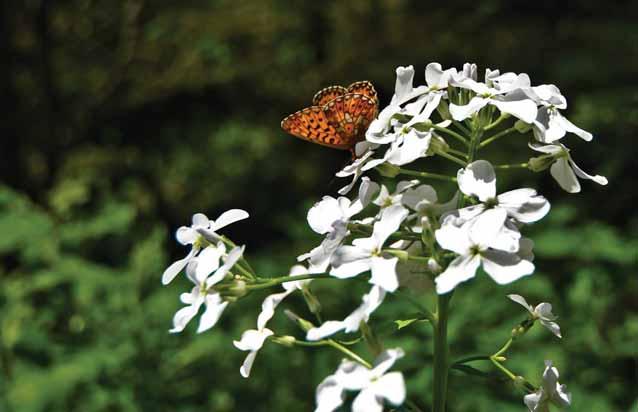
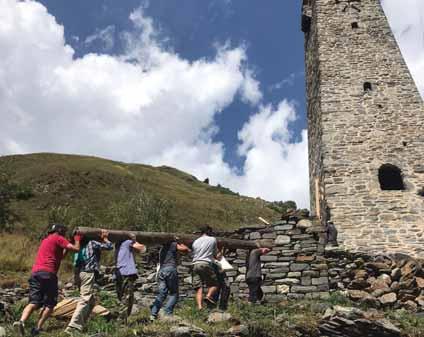 BY KATE RUTH DAVIES
BY KATE RUTH DAVIES
The European Commission and Europa Nostra announced the 2024 winners of the European Heritage Awards / Europa Nostra Awards, co-funded by the Creative Europe program of the European Union, on May 30. This year, 26 winners from 18 countries across the continent were honored.
“Our cultural heritage is our collective treasure, a bridge connecting our past, present, and future,” says Iliana Ivanova, European Commissioner for Innovation, Research, Culture, Education, and Youth.
“It holds a special place in our hearts and daily lives, fostering a sense of belonging and identity. The European Heritage Awards / Europa Nostra Awards highlight the crucial role of exemplary projects and individuals dedicated to preserving and promoting our rich heritage. I warmly congratulate this year’s winners on their outstanding achievements.”
Georgia was awarded a 2024 nomination in the Citizens’ Engagement & Awareness-Raising category for the Citizens’ Rehabilitation of the Tsiskarauli Tower in Akhieli. Over three years, 46 Georgian and international citizens collaborated with technical experts and traditional craftspeople to restore the
tower, bringing much-needed attention to the remote community of Khevsureti, and raising awareness of Georgia within Europe’s heritage arena.
The medieval watchtower in the Caucasus Mountains, which has witnessed war, occupation, and migration over the centuries, was severely damaged in 2001 by a Russian missile during the Second Chechen War. The restoration project not only gave new life to the tower, but also served as a model for the rehabilitation of Georgian defensive architecture.
The International National Trusts Organization (INTO) led the project in close collaboration with the National Trust of Georgia and REMPART (France), with support from a grant from ALIPH – the International Alliance for the Protection of Heritage in Conflict Areas.
Participants in the project, while learning new skills in stonemasonry and path building, also experienced each other’s intangible heritage, showcasing the peacebuilding capacity of collective restoration. The project helped boost the profile of volunteering in Georgia, offering young people the chance to engage with and take pride in their heritage.
The European Heritage Awards / Europa Nostra Awards, initiated by the European Commission in 2002 and managed by Europa Nostra ever since, have been instrumental for over two decades in recognizing and promoting the values of heritage for Europe’s society, economy, and environment.
eco-friendly policies.
Once distinguished for its rich biodiversity, Georgia now faces severe environmental challenges, stemming from human activities and climate change, which threaten its unique flora, fauna, and precious natural resources. Challenges include non-compliance with environmental legislation, unsustainable resource use, and slow adoption of green practices, issues which lead to biodiversity loss, land degradation, and pollution.
Georgia is striving for sustainable autonomy in the energy sector, but relies heavily on external sources and fossil fuels. Challenges persist in the utilization of renewable energy and efficiency in energy supply and consumption.
UNDP tackles these issues by advocating for biodiversity preservation, promoting renewable energy adoption, supporting sustainable urbanization, and championing waste management initiatives. Climate action remains central to the UNDP programs, aimed at reshaping climate policies, protecting communities and economies from climate risks, and fulfilling national commitments under global agreements like the Paris Agreement and the UN Framework Convention on Climate Change.
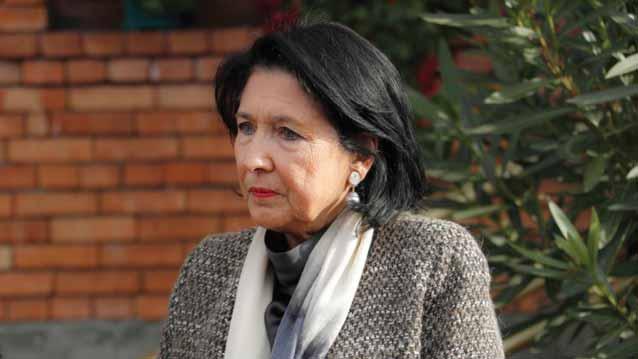
Bringing the Chinese to Anaklia, in this dose, is a stab to our relations with the American or European partners, – said the President of Georgia, Salome Zurabishvili, at the reception for representatives of opposition political parties who signed the “Georgian Charter”.
She claimed that the entire focus recently was on the “Transparency of Foreign Influence” law, which is why other decisions of the government were not given proper attention.
“In the recent period, we have less time and means to pay attention to the rest
of the laws which were adopted at an urgent pace, with accelerated procedures.
The whole focus has been on the ‘Russian law’ and we haven’t paid as much attention as we should have.
“For example, the ‘offshore law,’ which is anything but transparent. They like this word very much, but not always, and in this case it is a totally non-transparent law that opens the country to various capitals unknown to the public.
“Also, changes were made that worsen the election code, but that’s okay, we’ll deal with that too.
“A very harmful law on the pension
fund is being prepared. This is a bit more technical and complicated. What is happening now is the transfer of the pension fund into the hands of the government, and it is a very dangerous direction.
“And the fact that bringing Chinese business to Anaklia in such a dose is also a stab to our relations with our American or European partners,” she said. A Chinese consortium — China Communications Construction Company Ltd, together with China Harbor Investment — was selected as a private investor for the construction of the new deep-water port of Anaklia.
Continued from page 1
Parliament speaker and Georgian Dream member Shalva Papuashvili announced the new initiative just a day after signing the “foreign influence” law into effect, a law that requires news media and NGOs to register as “agents of foreign influence” if they receive more than 20% of their
funding from abroad. President Salome Zurabishvili's vetoed the “foreign influence” law, but Parliament overrode her. The law’s adoption is a move that has prompted concerns about the erosion of democratic principles and human rights in Georgia.
The Georgian Dream’s proposed
LGBTQ+ legislation again echoes laws in Russia, where public endorsement of “non-traditional sexual relations” and gender-affirming care have been banned for over a decade. In a recent development, Russia’s Supreme Court labeled LGBTQ+ activism as extremist, effectively outlawing it in the country.
Ukrainian troops used USsupplied Himars missiles to destroy an advanced air defense system inside Russia, leading the Kremlin to warn Washington that it could suffer “fatal consequences” for backing the cross-border attacks.
Several missiles are understood to have hit an air defense installation in the Russian city of Belgorod that was equipped with S-300/400 surface-to-air missiles.
Photos of the aftermath of the attack, which is believed to have happened on Sunday, show vehicles on fire and billowing smoke.
On Monday, Sergei Ryabkov, Moscow’s deputy foreign minister, said that the US would face “fatal consequences” if it allowed Ukraine to use American weapons for attacks inside Russia.
The US has so far allowed Kyiv to hit targets within Russia only if they pose an immediate threat to Ukrainian forces.
It is not clear if the strike on Belgorod breaches the limits the US imposed on the weapons, but Volodymyr Zelensky, the Ukrainian president, has been requesting permission to use US munitions for long-range strikes.
On Monday, those wishes were echoed by Dmytro Kuleba, the foreign minister, who told his Estonian counterpart that Ukraine was pressing its allies “on expanding the scope of weapons’ application.”.
OFFICIAL: USING WESTERN WEAPONS TO STRIKE
RUSSIAN TERRITORY COULD BE GAME-CHANGER
Ukrainian President Volodymyr Zelensky’s chief of staff said Tuesday that
using Western weapons to strike Russian territory could change the course of the war.
“Permission to use Western weapons on the territory of the Russian Federation is an extremely important decision,”
Andriy Yermak said on Telegram.
“Russian tactical aviation will not be able to be safe on the long approaches to the Ukrainian border,” he said, adding that “this will affect the conduct of the war, the planning of counteroffensive actions, and will also impair the Russians’ ability to use forces in the border area.”
Yermak’s comments come amid an apparent relaxation among Ukraine’s international allies over the use of Western weapons to strike targets within the Russian Federation. Several countries, including the UK and US, have recently given their blessing for Ukraine to use the weapons in such a way, within reason.
Last week, US President Joe Biden gave Ukraine permission to use Americansupplied weapons to strike targets in Russia, but only near the northeastern Kharkiv border region where a Russian offensive is in full swing.
16 high-rise buildings, 31 houses, a school and a hospital were among the buildings damaged in a Russian missile attack on the central Ukrainian city of Dnipro Tuesday morning, according to the city’s mayor.
“As of 09.00, more than 10 houses of the housing and utility sector were damaged. Nearly 300 windows. Six buildings of the homeowners’ association. Approximately 100 windows. A hospital and a clinic. Approximately 70 windows. A school. 31 private houses,” Dnipro Mayor

Borys Filatov said in a post on Telegram.
Local officials said earlier that the missile attack had injured seven people, including two children.
UKRAINIAN FIRST LADY: 550 CHILDREN HAVE BEEN KILLED IN THE WAR SO FAR
Ukrainian first lady Olena Zelenska said Tuesday that 550 children have been killed in Ukraine since the beginning of Russia’s full-scale invasion.
“I once again appeal to the international community: help us save our children. We cannot measure the value of their lives by the cost of air defense systems. Therefore, I appeal to everyone here: Our children need to be saved,” Zelenska said in a statement.
RUSSIA DERIDES KYIV FOR INVITING NEIGHBORS TO PEACE SUMMIT
Russia has poured scorn on Ukraine’s attempts to invite its former Soviet allies to a forthcoming peace summit in Switzerland on June 15, saying the invitation had been rejected by its neighbors.
Russia’s Deputy Foreign Minister Mikhail Galuzin told Russian news agency Tass that Ukrainian President Volodymyr Zelensky and his Western allies had “begged” the leaders of the countries of the Commonwealth of Independent States (CIS), an intergovernmental organization of Russia and former Soviet republics, to attend the conference in Switzerland, but claimed the invitation was refused.
“Heavy artillery was used: Zelensky and his Western ‘friends’ began to personally call and beg the leaders of the Commonwealth states to take part in this ‘gathering.’ We know that none of them succumbed to such persuasion,” the deputy minister said.
“Kyiv and its Western handlers actively sought to attract representatives from the countries of the global South and East. Of course, they did not ignore our partners in the CIS. We know for sure that they were regularly sent invitations that remained unanswered,” Galuzin said.
Georgia withdrew its participation in the CIS after a short-lived war with Russia in 2008, and Moldova suspended its involvement after Russia’s invasion of Ukraine in February 2022. Kyiv formally ended its participation in the CIS in 2018.
US VICE PRESIDENT WILL ATTEND UKRAINE’S PEACE CONFERENCE
US Vice President Kamala Harris and national security adviser Jake Sullivan will attend the Ukraine peace conference in Switzerland on June 15, the White House said Monday in a statement.
Harris will travel to Switzerland to underscore Washington’s commitment to supporting Ukraine’s effort to secure a just and lasting peace, based on Ukraine’s sovereignty and territorial integrity and the principles of the UN Charter, said the vice president's communications director, Kirsten Allen.
Harris will reaffirm US support for the people of Ukraine as they defend themselves against ongoing Russian aggression, the statement said.
The Kremlin has repeatedly said any talks around securing peace in Ukraine should involve Russia, which has not been invited to the summit.
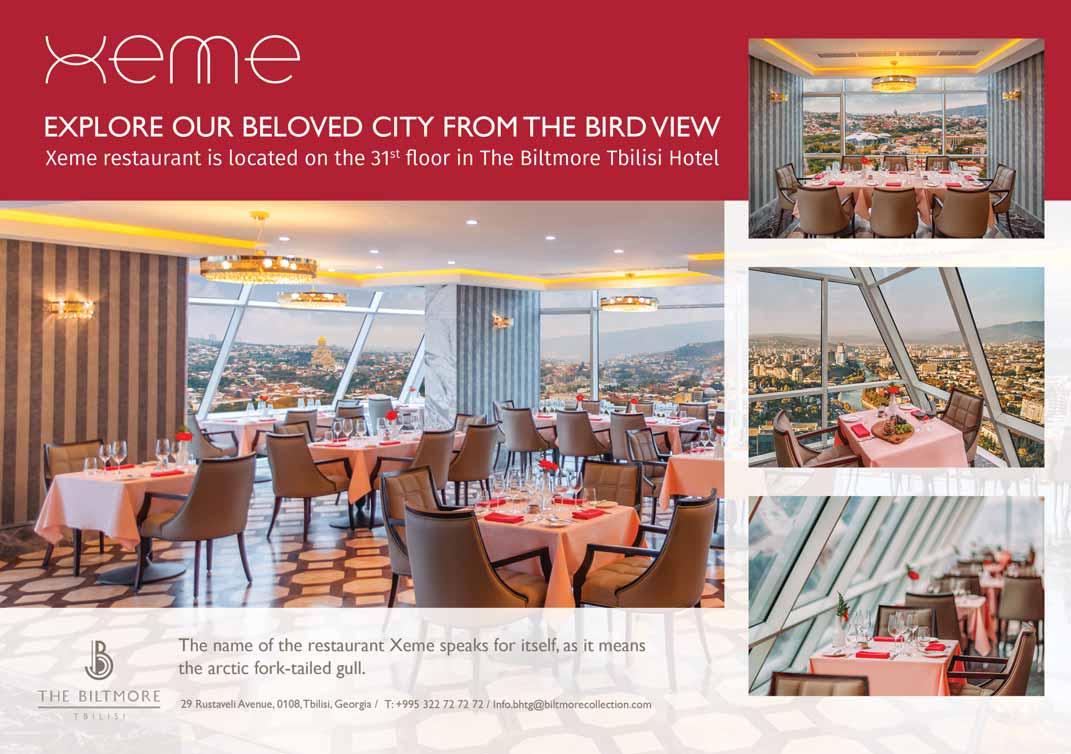
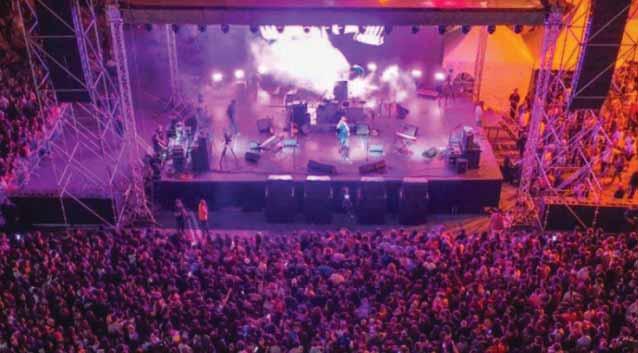 Photo: Ezz Gaber / Source: Mtavari Arkhi
BY IVAN NECHAEV
Photo: Ezz Gaber / Source: Mtavari Arkhi
BY IVAN NECHAEV
Throughout history, music has played a crucial role in political movements, acting as a voice for the oppressed, and serving as a powerful medium for expression, resistance, and unity. The recent charity concert "Musicians for a European Future" held on the First Republic Square in Tbilisi on June 2 epitomizes this dynamic. The concert brought together a diverse group of popular and trending performers, including Bedford Falls, Kordz, Mechanical Rainbow, Nino Katamadze & Insight, Kvela, Ara, MokuMoku, Circus Mircus, Quemmekh, LOUDspeakers, and others, each contributing their voice to the cause of resisting the law “on transparency of foreign influence”.
By raising more than $100,000 (according to the organizers) to support individuals fined for participating in protests against the Foreign Influence Transparency Act, the event underscores the potent role of music in political activism. Friedrich Nietzsche famously said, "Without music, life would be a mistake," highlighting the intrinsic value of music to human experience. In the context of political protest, music becomes a medium through which individuals and
groups can articulate their dissent and aspirations.
The roots of music as a form of political protest can be traced back to various historical periods. In the 18th century, during the American Revolution, songs like "Yankee Doodle" were used to mock British troops and bolster American morale. Similarly, in France, revolutionary songs such as "La Marseillaise" galvanized citizens during the French Revolution, becoming anthems of resistance and later national identity.
In the 19th century, abolitionist songs in the United States, like "Follow the Drinking Gourd," provided not only encouragement but also practical information for enslaved people seeking freedom via the Underground Railroad. These songs were covertly political, embedding messages of hope and resistance within their lyrics.
The 20th century saw an explosion of music as a tool for political activism.
The labor movement in the early 1900s utilized folk songs to rally workers.
"Solidarity Forever," penned by Ralph Chaplin in 1915, became an anthem for the American labor movement, encap-
sulating the struggles and hopes of workers striving for better conditions.
During the civil rights movement of the 1950s and 1960s, music was integral to the movement’s identity and momentum.Songs like "We Shall Overcome" and "A Change is Gonna Come" by Sam Cooke provided both comfort and motivation, helping to sustain activists through arduous struggles. These songs transcended mere entertainment, embedding themselves into the very fabric of the movement.
The Vietnam War era brought forth a new wave of protest music. Artists like Bob Dylan, Joan Baez, and later, John Lennon, with his iconic "Imagine," captured the anti-war sentiment and galvanized public opinion. Woodstock, the 1969 music festival, epitomized this era, blending music and political expression into a landmark event symbolizing peace, love, and anti-establishment ideals.
MUSIC AND POLITICAL CHANGE IN RECENT HISTORY
In more recent history, concerts and musical events have continued to play a significant role in political movements.
The 1980s saw the rise of benefit concerts like Live Aid in 1985, organized by Bob Geldof and Midge Ure to raise funds for famine relief in Ethiopia. While primarily a humanitarian effort, Live Aid highlighted the potential of music to
mobilize global audiences for social causes, combining entertainment with activism on an unprecedented scale.
The fall of the Berlin Wall in 1989 was accompanied by a significant cultural shift, with musicians like David Hasselhoff performing "Looking for Freedom" atop the wall, symbolizing the triumph of liberty over oppression. This event underscored the role of music in marking political milestones and fostering a sense of unity and hope.
THE ROLE OF MUSIC IN CONTEMPORARY PROTESTS
The 21st century has continued to see music at the forefront of political protests. In 2003, musicians played a pivotal role in the anti-Iraq War protests, with bands like Green Day and their song "American Idiot" capturing the anti-war sentiment. In 2011, the Arab Spring saw young people using music and social media to organize and express their aspirations for democracy and reform.
The "Musicians for a European Future" concert in Tbilisi is part of this continuum. Like the protest songs of the past, it uses music to rally support and raise funds for a political cause. The participation of diverse bands and artists in this concert underscores music’s ability to transcend individual differences and unite people around common ideals.
The relationship between art and political agency is a central theme in the philosophy of aesthetics. Theorists like Herbert Marcuse and Jacques Rancière have examined how art can disrupt the status quo and inspire political action.
Marcuse argued that art has the potential to reveal alternative realities and possibilities, thus challenging dominant ideologies. Rancière, meanwhile, posited that art can reconfigure the "distribution of the sensible," altering perceptions and opening up new spaces for political engagement.
Music’s emotional resonance can amplify the impact of political messages, making abstract and often complex issues more accessible and compelling to the general public.
Philosophers like John Dewey and Martha Nussbaum have explored the idea that art, including music, plays a crucial role in moral and ethical discourse. Dewey viewed art as a means of communication that can evoke empathy and understanding, thereby foster-
ing moral development. Nussbaum, on the other hand, emphasizes the narrative aspect of art, which can reveal the complexity of human experience and ethical dilemmas.
In Tbilisi, the charity concert "For a European Future," aimed at opposing the restriction of civil liberties, the suppression of dissent, and the expulsion of non-profit organizations that displease the establishment, made a powerful statement. By participating in this concert, musicians not only voiced their disapproval but also mobilized their fan bases, creating a ripple effect of awareness and engagement.
Music has a unique capacity to forge connections among individuals, fostering a sense of community and shared identity. Philosopher Jean-Luc Nancy discusses the concept of "being-with," emphasizing the fundamental social nature of human existence. Music, particularly in a live concert setting, embodies this concept by bringing people together in a collective experience.
The Tbilisi concert on the First Republic Square exemplifies how music events can transcend mere performance, becoming acts of solidarity and resistance. In this case, the concert was more than a fundraiser; it was a physical manifestation of collective opposition to an unjust law, providing a safe space for like-minded individuals to connect and support one another.
The collective experience of live music can reinforce a sense of identity and belonging among participants. The shared act of singing along, dancing, and simply being present in a space dedicated to a common cause can strengthen communal bonds and reinforce the participants' commitment to their ideals. This unity is crucial, especially in politically turbulent times, as it provides a morale boost and a reminder that individuals are not alone in their struggles.
The "Musicians for a European Future" concert in Tbilisi illustrates how music can act as a catalyst for protest, unity, and action, assembling communities around shared ideals and providing tangible support for activists. In a broader context, such events reaffirm the vital role of the arts in societal change, highlighting how creativity and solidarity can converge to challenge injustices and advocate for a more equitable future.
Georgian Foreign Minister
Ilia Darchiashvili on Wednesday celebrated this week's adoption of a resolution by the United Nations General Assembly concerning Internally Displaced Persons and Refugees from the Russian-occupied Abkhazia and Tskhinvali (South Ossetia) regions as a “great success for Georgian diplomacy.” Darchiashvili’s remarks came in response to the decision of the 78th UN General Assembly, which on Tuesday endorsed the resolution reiterating the right of return for all displaced persons and refugees to these regions, with 103 countries voting in favor, nine against, and 52 abstaining. Expressing gratitude, Darchiashvili thanked the supporting states, acknowledging their reiterated backing and aid to hundreds of thousands of internally displaced persons. He emphasized the continued importance of UN member
states actively participating as co-authors of such resolutions, noting that this year, 64 countries joined as co-sponsors from various regions across the globe so as to address this critical issue.
Highlighting the significance of the resolution, Darchiashvili underscored that its adoption keeps Georgia’s issue at the forefront of the world's highest international forum.
Georgian Prime Minister Irakli Kobakhidze also highlighted the increasing number of supporters for the UN resolution on IDPs from the Russian-occupied regions, stating, “The number of supporters of the UN resolution is increasing by the year. For this, we are especially grateful to the Ministry of Foreign Affairs, which is constantly working to ensure that the resolution related to IDPs has wide support.” He noted the recordbreaking 103 countries supporting the resolution this year, a substantial increase from the previous year.
The Ministry highlighted key points of the resolution, which condemns demographic changes forced upon the regions, affirms the right of IDPs regardless of
success”
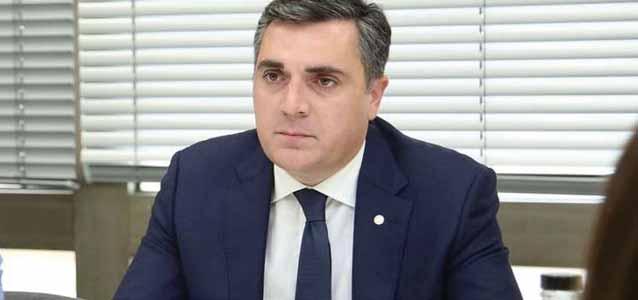
Source: MFA of Georgia
ethnicity to return to their homes with dignity and safety, and emphasizes the need to respect and protect their property rights. Additionally, the resolution urges participants of the Geneva International
Discussions to intensify efforts to improve security and human rights in the regions, facilitating the return of internally displaced persons and refugees to their homes. Furthermore, the resolution has practical implications, requiring the UN Secretary General to prepare an annual report on the situation of the displaced population in Georgia and the implementation of the resolution.
On June 4, the Helsinki Commission held a congressional hearing to support Georgia's sovereignty and democracy. Representative Joe Wilson led the session, hearing testimonies from key figures Ivane Chkhikvadze, EU Integration Program Manager at the Civil Society Foundation and Georgia Country Consultant at the European Endowment for Democracy; Natalie Sabanadze, Senior Fellow at Chatham House and former Georgian Ambassador to the EU; and William Courtney, Adjunct Senior Fellow at the RAND Corporation and former US Ambassador to Georgia. The hearing addressed recent events, such as Georgia adopting a Russian-style foreign agents law, the US announcing sanctions against those undermining democracy in Georgia, and a review of US-Georgian cooperation. Legislative actions like the MEGOBARI Act and the Georgian People’s Act, both aiming to impose sanctions on Georgian officials and review US-Georgia relations, were discussed. This week, Radio Free Europe/ RL’s Georgian Service sat down with William Courtney to get his takeaways from the hearing.
“All four members of the congress, as well as the witnesses, shared unanimous concern about Georgia’s new foreign agents law, and the risk that the October parliamentary elections will be rigged, including by abusing said law to make it impossible, for example, for independent media to accept commercial advertising, or to disqualify some candidates for office, things like that,” Courtney tells us. “We only need to take a look at what happened in Russia, where the Kremlin, using a similar law and some others, such as the law on undesirable organizations, virtually wiped out civil society and Russian independent media. We don't yet know exactly how the Georgian government is going to use or abuse the foreign agents law. But the pattern we see in Russia raises a lot of concern.”
WE KNOW HOW IT UNFOLDED IN RUSSIA, BUT HOW DID GEORGIA GET HERE? HOW HAS A STAUNCHLY PROWESTERN COUNTRY FOUND ITSELF IN THIS SITUATION?
Shevardnaze and Saakashvili were both in power for about a decade. During Shevardnadze’s tenure, there were some hopes for reforms, and he did carry out some of them; Saakashvili did considerably more, including his anti-corruption reform. Georgian Dream…. Well, they have been talking about reforms. But in all three cases, they overstayed their

welcome in power for too long, and turned more and more authoritarian to ensure they would stay in power. This in turn made them less and less popular.
use to tilt the playing field, if not outright steal the elections in October.
Most observers believe the foreign agents law is an instrument Georgian Dream can use to tilt the playing field, if not outright steal the elections in October
Let's hope the elections are as free and fair as possible. But right now, we're not so sure we expect that
Georgian Dream, I think about one in five people support them in Georgia at this point, and it increasingly appears that Bidzina Ivanishvili, who has close ties with Russia, is planning on using the foreign agents law to rig the elections in October, to avoid defeat.
YET NEITHER SHEVARDNADZE NOR SAAKASHVILI EMBARKED ON A CRUSADE AGAINST THE WEST. GEORGIAN DREAM SEEMS TO BE MAKING THAT U-TURN. WHY?
Yes, I think it’s fair to say that both Shevardnadze and Saakashvili, whatever their shortcomings might be, were trying to escape Russia. But in the case of Georgian Dream, Ivanishvili doesn’t even hide his affiliation and interests with Russia.
And while there were doubts from the beginning, now we’ve seen revealing signs that this is a pro-Russian billionaire, one who is willing to use his money and other resources to take the government in an anti-democratic direction.
That's a major concern for us. It's a surprise, really, for many in Europe and in the United States. But Georgia turning away from the West really is happening, and it’s happening at a rapid rate.
YOUR QUOTE DURING THE HEARING: “IF THE ELECTIONS ARE RIGGED IN A MAJOR WAY, THEN WE MIGHT EXPECT SOME SORT OF A REVOLUTION SCENARIO.” WHAT HAPPENS IF THEY ARE RIGGED ONLY JUST ENOUGH TO TIP THE SCALES?
Then perhaps the risk of public unrest is lower. But let’s look at Georgia, Ukraine and Belarus – in all those cases, stealing elections played a key role in bringing out civil society. We will have to see what happens in these October elections, the extent to which the elections are rigged.
But most observers believe that the foreign agents law is aimed at being an instrument that Georgian Dream can
YOU ALSO SAID: “THE WEST CANNOT BE A MAJOR PLAYER HERE,” THAT WE SHOULDN’T EXPECT THE WESTERN CAVALRY TO COME AND SAVE THE DAY. WHAT IS REALISTIC TO EXPECT FROM THE WEST, THEN?
It’s up to Georgians to decide what the reaction is going to be. Let’s look at the Rose Revolution, the Orange Revolution, Maidan, and the protests in Belarus –popular unrest was driven by the people themselves, while the West was on the margins. We’re likely to see the West be supportive of those who want to have free, fair elections. There can be more sanctions, depending on the extent to which the election is stolen. It’s difficult to predict at this point. I do believe that no one in the West thinks the West has much power to influence the outcome of the elections or how the foreign agents law is going to be implemented inside Georgia.
MOST OF THOSE OUT IN THE STREETS SUPPORTING THEIR COUNTRY’S EUROPEAN FUTURE EXPECTED THE WEST TO DO ITS BIT, ESPECIALLY WHEN IT CAME TO INDIVIDUAL SANCTIONS. WILL THEY COME? IF SO, WHEN?
Let's take the foreign agents law in Russia. The law itself aroused concern in 2012, but it was the implementation of the law that had the biggest impact: That independent media which were designated as foreign agents could not receive commercial advertising, that individuals who were tied to being foreign agents couldn't run for election. A lot will depend on how Georgia’s version is implemented. But, probably, if the main aim of Georgia Dream is to reduce the risk of losing in October, we're likely to see something like what Russia did. In Russia, implementing a foreign agents law in a cynical way wasn't enough for the Kremlin, and in 2015 came the “undesirable organization law,” and it used the two of them
together to wipe out civil society. We don't know what path Georgia is going to take, but the path that we see in Russia certainly causes a lot of foreboding about what might be in Georgia’s future.
AND AT WHAT STAGE DO SANCTIONS COME INTO PLAY?
Sanctions are preventive measures. Although Secretary Blinken made the announcement about travel restrictions a week or so ago, no restrictions have been made. The State Department will be waiting to see what happens and how things are implemented. These things are usually implemented after something happens, just as most of the sanctions on Russia were implemented after the full-scale invasion started on February 24, 2022.
THAT WOULD MEAN THAT SANCTIONS, BY AND LARGE, ARE NOT PREVENTIVE, BUT PUNITIVE.
Well, the purpose of sanctions is to raise the cost for Georgian Dream to take further repressive steps. So it's to raise the cost of going further.
THAT MEANS THAT THOSE 84 PEOPLE WHO VOTED FOR THIS LAW WON’T BE SANCTIONED UNTIL THE LAW IS PUT IN MOTION AND EXPLOITED? THEY'VE ESCAPED PUNISHMENT AT THIS POINT, THEN?
It’s possible, but we don't really know. Europe has not talked about sanctions as much as the US has; the German Ambassador said that the EU will not begin accession talks as long as the law is in force. So we'll have to wait and see.
DOES THE EU STOPPING ACCESSION TALKS SOUND LIKE A BIG DETERRENT FOR GEORGIAN DREAM? IS IT NOT A BLESSING IN DISGUISE FOR THEM THAT THEY WON'T HAVE TO MAKE THE REFORMS THAT BRUSSELS IS ASKING OF THEM? That's quite possible. Looking back at December 2023, granting Georgia acces-
sion privilege, even as Georgia was moving backward, that was a calculated bet by a European Union that it could offer incentives and reverse the direction of policy in Georgia. That gamble did not pay out. Instead, Georgian Dream used the granting of candidate status to legitimize itself and say, “oh, we are moving towards Europe.”
THEY ALSO SAID: “NOT ONLY ARE WE MOVING TO EUROPE, WE ARE MOVING THERE ON OUR OWN TERMS. THEY HAD TO CEDE GROUND AND THAT'S HOW STRONG WE ARE.”
Yes. So the attempt to support Georgia’s accession was a good attempt, the intentions were good. But as the saying goes, the road to hell is paved with good intentions.
WHAT DO YOU THINK GEORGIAN DREAM’S CONCLUSIONS WOULD BE OF THE JUNE 4 HEARING?
Georgian Dream is taking the actions it is taking with the purpose of staying in power, even though it has become unpopular. There's not much the West can do that is going to overpower Georgian Dream’s motivation. They will probably try to find some ways to be careful and not become subject to too many sanctions, but they also show no sign of changing the direction they’re pushing the country in. In the last few days, we have seen thugs beating up civil society individuals and media representatives, we've seen one Georgian parliamentarian threatening to charge anyone who opposes the law with treason. That’s their direction, and whatever the West does, it doesn’t seem likely that that direction will change fundamentally. WHAT ABOUT THE MEGOBARI ACT? IT HAD AN INTERESTING COMBINATION OF STICKS AND CARROTS, AND CAUGHT A LOT OF PEOPLE'S ATTENTION. I'm with the RAND research organization, so I cannot comment on specific legislation. But I will say this: The focus in the West is really going to be what happens prior to the elections in October and the outcome of the elections. We in the West will be watching. Let's hope the elections are as free and fair as possible. But right now, we're not so sure we expect that.
On June 6, the Council of Europe shared its report, ‘Prisons and Prisoners in Europe 2023: Key Findings of the SPACE I survey,’ authored by Marcelo F. Aebi & Edoardo Cocco. The report summarizes key findings from the 2023 Council of Europe Annual Penal Statistics on Prison Populations, better known as SPACE I, an acronym derived from its French name, Statistiques Pénales Annuelles du Conseil de l'Europe. A total of 48 out of the 51 prison administrations across the 46 Council of Europe member states responded to the 2023 SPACE I questionnaire, contributing to this year's survey, signifying a 94% participation rate. The sole administrations that refrained from replying were those of Bosnia and Herzegovina, specifically the State PA, the Federation of Bosnia and Herzegovina PA, and the Republika Srpska PA. The report serves as a crucial resource for policymakers, advocates, and stakeholders in Georgia and across Europe, highlighting areas for targeted intervention and reform within the criminal justice system.
On 31 January 2023, there were 1,036,680 inmates in the 48 prison administrations of Council of Europe member states that participated in the SPACE I survey. Significant variations in prison population rates can be observed across regions. Generally, countries in Eastern Europe and the Caucasus region, including Azerbaijan, Georgia, and Türkiye, exhibit considerably elevated prison population
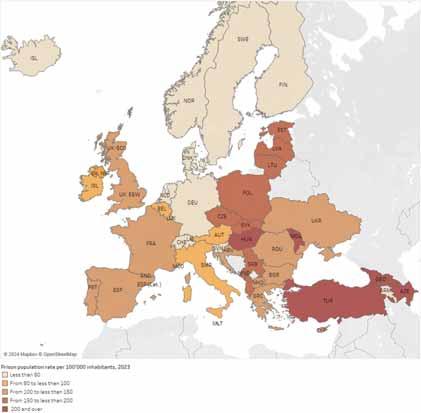
Map 1. Prison population rates (number of inmates per 100,000 inhabitants) on 31 January 2023 (N=48)
rates compared to their Western and Northern European counterparts. On the other end of the spectrum, countries such as Germany, the Netherlands, Slovenia, Switzerland, and the Nordic nations report remarkably low prison population rates.
The countries reporting the highest inmate-to-staff ratios, such as Türkiye and Georgia, also have the highest prison population rates. Conversely, several
countries with the lowest ratios, including the Netherlands, Norway, and Denmark, are also among those with the lowest prison population rates.
Here's a focused look at the findings concerning Georgia. Note that prison data for Georgia exclude territories that are not under government control.
PRISON POPULATION
As of January 31, 2023, Georgia reported
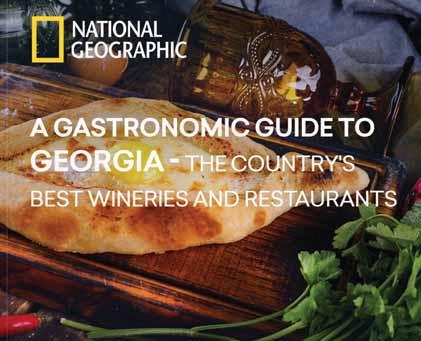 BY MARIAM MTIVLISHVILI
BY MARIAM MTIVLISHVILI
a prison population of 256 inmates per 100,000 inhabitants, marking it as among the countries with the highest incarceration rates.
While Georgia's figures are notable, it is essential to acknowledge the broader context. Comparatively, countries in Eastern Europe and the Caucasus, including Georgia, have significantly higher prison population rates than their Western and Northern European counterparts.
INCARCERATION TRENDS
The SPACE I survey notes a concerning trend of increasing incarceration rates in Georgia, alongside other countries like the Republic of Moldova and North Macedonia.
Georgia appeared second in the list, after Türkiye, of countries with the highest incarceration rates, at 256 per 100,000 inhabitants.
Despite efforts in some nations to stabilize or reduce prison population rates, Georgia's rates have risen by 8.2%.
The average age of inmates in Georgia’s penal institutions is 44.
Georgia has 82 inmates per 100 available places.
Georgia is among the countries with the lowest percentage of women inmates (3.4%).
Among the countries with high prison population rates, Georgia’s percentage of inmates serving sentences under 6 months is less than 1%.
PRE-TRIAL DETAINEES
Approximately one-third of inmates in European prisons are in pre-trial detention. In Georgia, the proportion of pretrial detainees is notable, indicating challenges within the legal system regarding detainment before trial.
Drug-related offences remain prevalent among prisoners, constituting 18.5% of the prison population in the surveyed countries. In Georgia, as in other countries such as Latvia and Azerbaijan, over a quarter of all inmates are convicted for drug-related offences. The survey of the 48 countries that participated notes this is followed by homicide or attempted homicide (12.8%), theft (11.5%), robbery (7.7%), assault and battery (6.7%), sexual offences excluding rape (4.6%), rape (4.3%), economic or financial crimes (3%) and road traffic offences (3%).
Georgia's penal statistics reflect broader regional trends of high incarceration rates and significant proportions of pretrial detainees and drug-related offences. These findings underscore the importance of continued efforts to address issues within the justice system, promote alternative sentencing measures, and address underlying social and economic factors contributing to crime and incarceration.

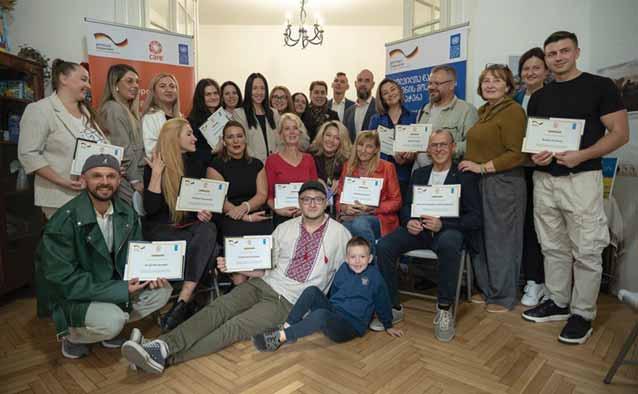
Farhad Azima, an aviation executive and citizen of the United States of America has applied to the Georgian Supreme Court for the recognition of an approximately £8.9 million order of the High Court of Justice of England and Wales against the Ras Al Khaimah sovereign wealth fund, Ras Al Khaimah Investment Authority (“RAKIA”). RAKIA is the owner of a Georgian subsidiary, Ras Al Khaimah Investment Authority Georgia LLC (“RAKIA Georgia”) which, until last week, owned the Sheraton Grand Tbilisi Metechi Palace Hotel, managed by the Marriott Group.
Mr Azima has been seeking to prevent RAKIA from disposing of its Georgian assets, including the Sheraton Grand Tbilisi, but last week RAKIA transferred this to Tbilisi Hotels Holding LLC for USD 44.8 million, in an apparent effort to avoid enforcement action. However, directors of the new entity are all also directors of RAKIA Georgia and Senior Executives at RAK Hospitality Holding LLC, including Alison Jayne Grinnell their Chief Executive Officer, Stefan Johann Hanekom their Chief Financial Officer, and Donald William Bremner their Chief Operating Officer.
Mr Azima commented:
“It is disgraceful that Ras Al Khaimah sovereign wealth fund is unwilling to pay its English Court ordered debts. It has now been almost eight months since
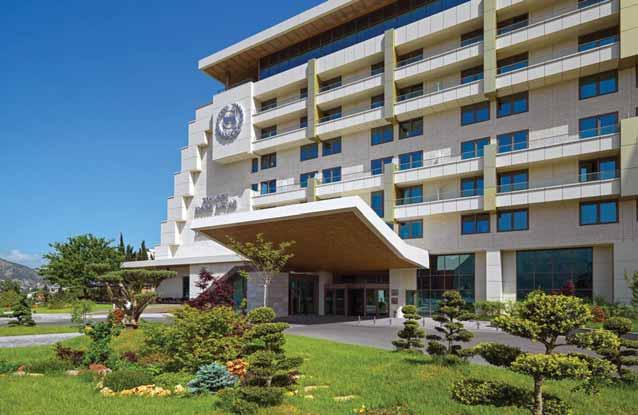
they owed me substantial sums, and I am left with no option but to enforce the debt. When the Ras Al Khaimah sovereign wealth fund has no respect for the rule of law, that casts a shadow over the investment climate in the Emirate. Switch-
ing ownership is a crude attempt to avoid enforcement, which will not succeed. We warn any third parties against assisting RAKIA in the dissipation of assets.”
In 2016, RAKIA sued Mr Azima in the English High Court, relying on certain
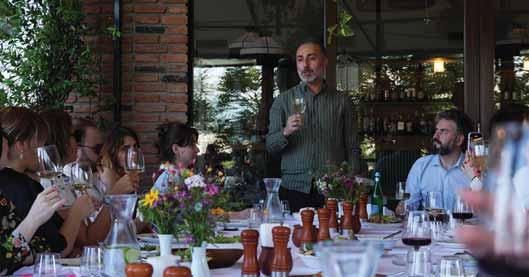 BY TEAM GT
BY TEAM GT
On June 5, GEORGIA TODAY invited its business partners to a dinner at Ginger Hotel & Restaurant (49 Polikarpe Kakabadze St., Tbilisi).
On a cozy, shaded, very-Tbilisi style terrace bedecked with plants, overlooking the capital city, the GEORGIA TODAY management team hosted Terabank representative Ani Jvaridze, Aleksandre Mikeladze from Sabuko, So
fia Dvalishvili from Moma (Museum of Contemporary Art), Tbilisi Hills’ Maya Shanshiashvili, Ana Vachadze representing Biltmore, Elene Makharoblishvili from Gumbati Holding, CENN’s Ana Petriashvili, Mariam Kapanadze from the Israel Chamber of Commerce, PMCG’s Nini Metreveli, Tajo Zghenti from Halik Bank, Koka Gobejishvili from Megalab, Mariam Mestvirishvili from Alte University, Irina Zhorjoliani and Kenan Ince representing Turkish Airlines, Maka Tkhomelidze from Swiss Hotel, and Keti Zhvania, Irina Benia, and Nino Chirakadze from EFES. Wine was provided by Winery Khareba, while the impressive dinner was prepared by the Ginger Hotel & Restaurant team under the leader-
ship of Sous Chef Giorgi Chotorlishvili, from a menu designed by Chef Lika Gulua and guided by the vision of Irma Kalandadze, the Executive Director of Ginger Hotel & Restaurant. The accent was Apkhazuri-Megrelian, with leafy green tarragon, lettuce and tomato salads, moist and filling phkali with cornbread slices, Samegelo’s table star “ghomi,” delicious khachapuri sprinkled with fresh tarragon, and the mountain folk’s favorite meat dish, kubati. The dessert, named “PelaMocchi” was much anticipated- icecream stuffed pelamushi rounds with walnuts and dabs of caramel sauce. All ingredients were fresh and gently filling, leaving one feeling full, but healthily so!
General Manager of GEORGIA TODAY, George Sharashidze, spoke with his guests about the newspaper’s beginnings back in 2000, while the management team Natasha Chikvaidze, Sofia Bochoidze, and Editor-in-Chief Katie Ruth Davies, spoke about the various publications under the brand- GT newspaper, GT Business magazine and Where.ge tourism magazine. The guests were thanked for their tireless work, alongside GEORGIA TODAY, to promote Georgia, to up the country’s standards to align with Western expectations, and for displaying the best of its people, traditions and culture.
documents obtained from 30GB of private and confidential data which had been hacked from Mr Azima and published online. Mr Azima counterclaimed that RAKIA was responsible for the hacking and publication of his data.
Over the next four years, evidence came to light that RAKIA and its advisors had engaged private investigators to hack Mr. Azima, report on the contents of his data, and release it online. One investigator admitted to the hacking and, with others, partaking in a conspiracy to cover it up: witnesses were suborned, disclosure was deliberately withheld, misleading evidence was rehearsed, including at a ‘perjury school’ run by a Dechert LLP lawyer at a luxury Swiss hotel, and false evidence was submitted to the English High Court.
In June 2022, in light of the new evidence, RAKIA wrote to the English High Court stating that it would play no further part in the proceedings. RAKIA confirmed that it would honor any judgment entered against it.
RAKIA subsequently breached various court orders, including by failing to provide disclosure and to put forward a defense. On application from Mr Azima, by an Order dated 3 October 2023, the English High Court entered judgment against RAKIA and awarded Mr Azima indemnity costs and interest worth approximately £8.9 million.
RAKIA has failed to make any payment to Mr Azima and remains in breach of the October 2023 Order. Mr Azima is therefore taking enforcement action in Georgia and worldwide to prevent RAKIA from disposing of its assets.
SPONSORED CONTENT

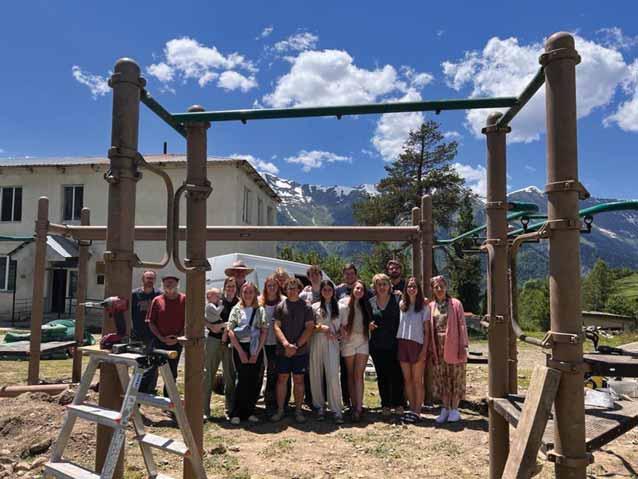
Apologies to Shakespeare, if only a little, for borrowing the phrase and twisting it far out of context. But it fitted well.
A new playground set is being put together in the yard of Etseri school. This is a gift from an organization called akhalgazrda miznit in Georgian, coming up here all the way from the other side of Tbilisi. It had sat there in pieces waiting for someone to want it, with a few potentially interested parties taking too long to decide, and I jumped at the chance when I heard it was still available. Even the truck transport price of 1000 GEL for it was paid by a friend of mine. The driver, an Azeri in Svaneti for his first time, asked me, “What on earth brought you up here?” To which I spread out my arms and simply said, “The beauty.”
All the labor to clean and install it, too, comes free, courtesy of a young, enthusiastic volunteer group from the USA, here for a few days mostly for this very
purpose. In short, all the pieces have come together most wonderfully.
There were a large number of metal and tough plastic pieces (all sortable for a winter in Minnesota, USA, not known for its mild winters) which greeted us when the truck door was opened, drawing gasps from the curious schoolchildren waiting. By this point, the rumor of its imminent arrival had spread, so anticipation was high; and not disappointed.
A last hurdle had been overcome when the school director called her boss in Mestia. “Is it a gift?” “Yes.” “Then we don’t need any paperwork at all; plus, Tony’s one of us, so open all doors!” Most gratifying. We agreed on a location for the roughly 8 by 12 m set with the school director and village mayor, and it was time to unload.
Some people set to cleaning all the pieces, which had been plastic-wrapped some years earlier, but were nonetheless a bit worse for weather, with rags and water. The main engineer in charge of putting the whole complex thing together laid out all the pieces in their proper places, and then spray-painted hole loca-
tions right on the ground.
I had organized a digger, which showed up the next morning right on time and made short work of all the holes with its narrowest bucket, plus some leveling of the ground afterwards, in about half a day. The location is a bit prone to getting wet with all the spring snow-melt runoff, so a channel to divert this water is also planned for the summer holidays, which will start at the end of next week.
Then it was time to start carefully setting up the large metal posts in the holes, in sets of 3 or 4, align them to all be vertical with painstaking micro-adjustments of rocks underneath and a sledgehammer, temporarily fix each set with planks, then concrete each set into place.
I had done my best to organize a mixer, but it fell through at the last minute due to some faulty electrical parts, so the young men learned how to mix concrete with shovels on a large sheet of steel. (Gravel, sand, cement powder in the right proportions; mix well; make a crater in the middle of the cone; add water, and mix carefully so the water permeated through it and doesn’t run out. Quite a skill, though now they’re

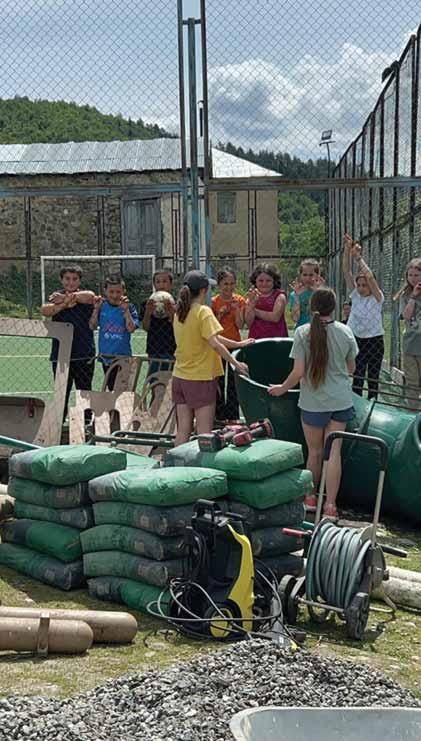
becoming masters at it).
There’s a spiraling slide; swings; things to climb and crawl all over. It’s a bit much for kindergarten-age children alone, so we ruled out putting it on their territory, as well as on private land. Here, it will serve all ages. They are already looking longingly at it: but we’ve warned them that they must wait until the last bit of cement is dry, or they run the risk of knocking something out of true and having it stick that way!
There are also the cows to keep out, a practice which is bringing a certain amount of chaos to their routine, which bothers me not at all. They only wander around and leave manure here and there, and I would keep them out permanently if it was up to me. But wiring the large
and small gates shut, plus chasing them out when pupils forget this rule, is working fine.
A few more days and the magnificent thing will be complete, ready to bring many years of enjoyment to the whole village, we hope. Really glad to be the recipients of this fine gift. Play on!
Tony Hanmer has lived in Georgia since 1999, in Svaneti since 2007, and been a weekly writer and photographer for GT since early 2011. He runs the “Svaneti Renaissance” Facebook group, now with over 2000 members, at www.facebook.com/groups/ SvanetiRenaissance/ He and his wife also run their own guest house in Etseri: www.facebook.com/hanmer.house.svaneti
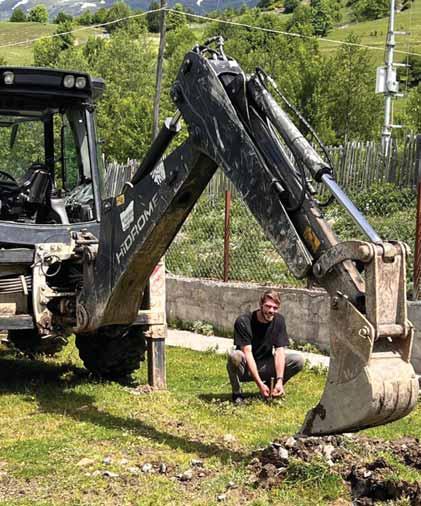
For the first time, the Georgian National Tourism Administration participated in the international tourism exhibition Riyadh Travel Fair in Saudi Arabia.
The GNTA stated that about 20 private companies and state organizations participated in the 3-day exhibition together with them.
At the Riyadh Travel Fair, at the Georgia’s stand, guests had the opportunity to familiarize themselves with Georgia’s tourism products.
Over 200 companies and organizations from 32 countries participated in the international tourism exhibition in Saudi Arabia, and more than 23,000 visitors visited the exhibition.

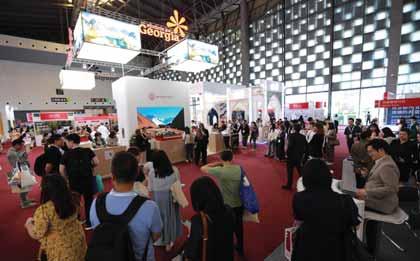
The Georgian National Tourism Administration took part in the international tourism exhibition in Shanghai, China, for the first time. About 10 private companies from Georgia attended the exhibition.
The Georgian National Tourism Administration stated that at the ITB China tourism exhibition, the executive director of ITB, Mario Tobias, visited the stand of Georgia together with the largest Chinese tourism companies. Tobias wished Georgia success and said that the country has a great potential to attract tourists.
At the exhibition, at the stand of Georgia, visitors had the opportunity to familiarize themselves with the tourist products of the country.
UNDP Georgia stated that Petr Kubernát, Ambassador of the Czech Republic to Georgia, visited Machakhela Protected Landscape to review ongoing initiatives and discuss future partnerships for sustainable development in this unique area.
UNDP Georgia also noted that UNDP and the Czech Republic proudly sup-
port its development focusing on both nature and community gains. They help develop effective urban and spatial planning systems to protect biodiversity and preserve historic settlements. This impactful initiative is led by UNDP Georgia, funded by the Czech Government, and implemented in partnership with Georgia’s Ministry of Environmental Protection and Agriculture and Khelvachauri Municipality.
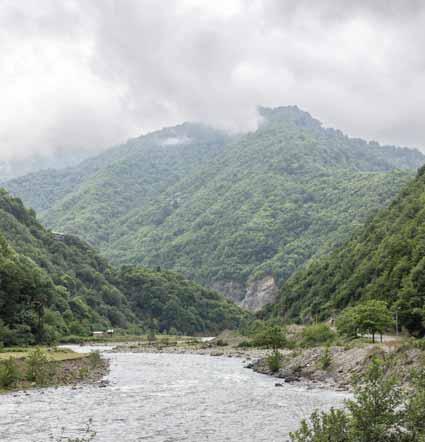
 BY SHELBI R. ANKIEWICZ
BY SHELBI R. ANKIEWICZ
Former Georgian Bolshoi ballerina Nina Ananiashvili is hosting the fifth annual Tbilisi Ballet Festival from June 22 to June 30 with the addition of numerous international dancers. Since 2017, Nina has consecutively been running the international festival, with just a three-year break due to COVID-19. The event will host globally renowned ballet stars this year, as well as the State Ballet of Georgia ballet company and the orchestra from the Tbilisi Opera House.
The festival will take place at the Z. Paliashvili State Opera and Ballet Theater of Tbilisi. The first two days, June 22 and 23, will commence with contemporary choreography performances.
The ballet company will present the
premiere of two one-act ballets to the audience: The ballet Ashes, staged by the Danish choreographer Sebastian Kloborg, while Israeli contemporary choreographer Maria Barrios will stage the ballet Eyeblink, set to the music of Antonio Vivaldi and Astor Piazzolla.
The week will continue on June 25 with the ballet ‘Giselle’ created by Adolphe Adam and led by Daniil Simkin and Maria Kochetkova. On June 28, there will be the ballet ‘La Bayadère’ by Ludwig Minkus, performed by the lead soloist of the State Ballet of Georgia, Nino Samadashvili, and the principal soloist from the Finnish Opera and Ballet Theatre, Michal Krcmár. The libretto, or story, of this ballet, is by Nina Ananiashvili after Sergei Khudekov and Marius Petipa, and there will be excerpts from the legendary Vakhtang Chabukiani’s choreography.
The festival's final day on June 30, will present a performance of ‘Swan Lake’
featuring the principal dancers from the Royal Ballet in London (Covent Garden), Fumi Kaneko and Vadim Muntagirov. Tickets for the performances are sold individually and can be found online or at the theater's box office.
The State Ballet of Georgia is participating in many events leading up to the ballet festival later this month. On June 2, the ballet had a rehearsal at the Tbilisi Opera House of the performance, Sagalobeli, a dance that was made to be paired with Georgian folk music. Nina Ananiashvili said it’s one of the company’s signature works.
“This is our trademark. We perform this ballet around the world, and it’s always very successful,” Nina told us before the rehearsal.
The performance lasted around 30 minutes and was wonderfully constructed, with sounds from the Changi Ensemble, Changi being a Georgian string instrument. The piece was choreographed by Ukrainian-born choreographer and former principal dancer of the Bolshoi Bal-
let, Yuri Possokhov, who used dance to express Georgia through his eyes, in aesthetics, arts, and music.
The ballet showcases the skills of dancers through lifts, pivots, lunges, and other techniques, while incorporating subtle glimpses into traditional Georgian dance. It is wonderfully balanced between group scenes, solos, and pairs, connecting with the audience and allowing them to have a little taste of the culture. This is evident not only through the dance and sounds that are heard throughout the performance, but also through the costumes designed by Anna Kalatozishvili.
Each piece of clothing was vibrant, with rich grays, greens, and browns, bringing autumn in full force to the stage. The designs were simple, yet elegant when paired with the movement of the dancers and the music.
Kalatozishvili has worked for the movie and theater industry for nearly 30 years after she graduated from the Tbilisi State Academy of Arts in Georgia and the Academy of Fine Arts in Vienna. She

said her inspiration always stems from her choreographer, but that she tries to find a focus based on the original material of a piece, such as culture, music, geography, etc.
“This project was especially interesting for me, because I got to work with Possokhov, and it was amazing,” Kalatozishvili told GEORGIA TODAY. “I think my costumes in Sagalobeli reflect the Georgian culture – I always try to make costumes my own way, through my eyes and opinions. When other people see this, I am happy.”
Sagalobeli, translated as ‘Canticle’ or ‘Hymn’, is a one-act ballet specifically created for the State Ballet of Georgia that debuted on February 2, 2008. Last week’s rehearsal of the performance was to prepare dancers for the open-air Yerevan Ballet Festival that they partook in on June 5. There, the State Ballet performed Sagalobeli as a part of their triple bill program.
According to a review written in April 2023 by The New Criterion, a literarybased magazine, after the State Ballet of Georgia performed in New York, this ballet has the potential to be a long-term performing dance.
“The piece is a strong argument in favor of combining neoclassical ballet and traditional styles of dance,” wrote Hilton Kramer Fellow Jane Coombs in her review. “Still fresh after fifteen years, Sagalobeli looks set to become the SBG’s signature piece, their very own Serenade.”
Currently, there are no performances of Sagalobeli scheduled in Tbilisi; the rehearsal was open only for the Friends of the Georgian Ballet.
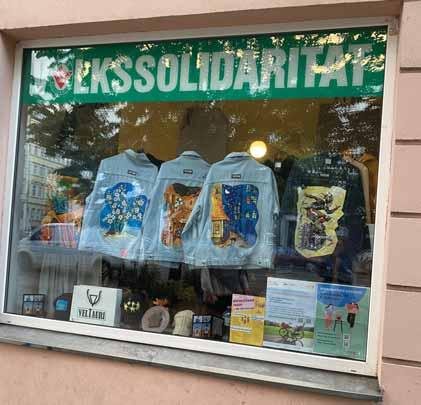 BY LILY FÜRSTENOW
BY LILY FÜRSTENOW
May 2024 was marked by massive demonstrations in Tbilisi against the notorious "Foreign Agents Law" that was approved by Parliament in spite of all the local upheavals and international outcry. With all this in mind, the Maikunst Festival of Georgian artists in Volkssolidarität Berlin, within the Art in Public Spaces Project framework, acquired a whole new meaning, questioning the role of art in times of crisis, and its ability to cause change.
Andro Dadiani's video "Fist" (Mushti), made a couple of years ago and screened during the opening reception, offered an ironic and bitter comment about the futility of protests and the failure of arts to effectively intervene in political processes. His short film recording an allegoric gesture of protest - a fist made of ice that gradually melted in the heatused as its setting the very square in front of the Georgian parliament building that for decades has been the site of protests of the population against all sorts of injustices and hardships taking place in the country. Yet, like the recent protests against the controversial "Agents Law," most of the demonstrations remained mere gestures of public disobedience and a pathetic movement causing little actual transformation.
It has not been the purpose of the Maikunst Festival to involve itself in the political affairs of Georgia, but rather to focus on the arts and crafts from the country, to make visible the work of the exceptionally talented contemporary Georgian artists based in Tbilisi, giving them a chance to present their current artistic practice, creative aspirations,
and the inspiration that they take from the centuries-old Georgian traditions of arts and crafts, as well as influences of European modernism.
One of the best examples of the longevity of traditional Georgian handmade art is evident in the artworks and design items made of teka-fabrics by Khatuna Kobeshavidze. Her teka pieces with floral compositions combine a variety of textiles and cloths, arranged in intricate sequences and patterns. Some inspired by subtle color gradations, others by motives invoking Picasso‘s cubist compositions, show the artist's skill, craftsmanship and passion for experiment. Her recycled Teka bags are stylish and practical for daily use.
Design and innovation bringing together art and fashion are signature trademarks of Tata Veltauri who exhibits a set of hand-painted gender neutral wearables for young and old. Her special technique of color application on fabric is unique, and her motives from art history, ranging from Gustav Klimt's iconic motives to pop culture imagery, make her outfits spectacular and eye-catching. Slogans and citations in Georgian letters handwritten on fabric by the artist, who uses special water-proof color pigment, look ornamental and enigmatic, making outfits by the VELTAURI brand timeless and contemporary at the same time.
Jewellery by Georgian artist Natka Davitelashvili presented at the exhibition is made of precious stones and minerals. The pieces exude a polished and shimmering allure, combining raw beauty with artistic skill. Beads, bracelets and earrings featuring animal motifs capture nature's elegance, creating unique and vibrant pieces that reflect both the wearer's style and a connection to the natural world.
Further on, the show features numerous contemporary Georgian painters:
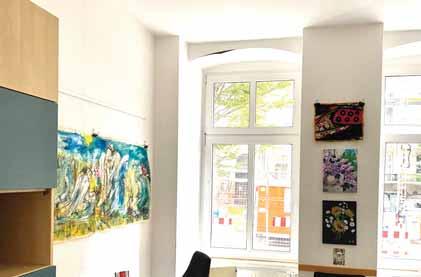
Vaxo Saladze for one. His oil on canvas paintings, executed with an experimental mixture of pigments, showcase a masterful blend of figurative motifs and non-figurative abstract styles. The intricate compositional setup invites viewers into a dynamic visual experience, where recognizable forms seamlessly merge with abstract elements, creating a rich tapestry of color, texture, and form.
Mariam Kandiashvili's paintings of urban landscapes capture the mundane yet evocative scenes of roundabouts, car washes, and factory buildings piping chimney smoke. The grey skies and winter days set a melancholic tone, highlighting the stark beauty and raw reality of everyday life. Through their detailed depiction of trivial settings, these works invite contemplation on the overlooked aspects of our urban environment.
Sopo Koridze's large-scale canvases blend figurative elements with delicate colors and flowing forms, creating a harmonious fusion of environments. Their poetic aura invites viewers into a dreamlike space, where the interplay of light and shadow evokes a sense of tranquility and introspection. The artworks' expansive nature and subtle details offers a meditative experience, celebrating the beauty of both the natural world and human imagination.
Sophia Beltadze's small yet dense oilon-canvas paintings deal with the topic of "home sweet home" depicting the interiors of dwellings in somber tones of reds and blues, with isolated furniture pieces: Armchairs and lamps being the usual settings of average apartments, obvious symbols of cosiness. The intimate scale and rich details evoke a sense of solitude and introspection, highlighting the quiet, contemplative moments within domestic spaces.
Ketevan Kharaidze's mountain landscapes depict the Caucasus rocky horizons with towers beautifully fitted in. Her nature-mortes feature flowers, such as chamomile flowers, arranged in vases with contrasting backgrounds. The delicate white petals of the chamomiles stand out vividly against the black backdrop, and lilacs in a white vase add a touch of elegance and simplicity. The compositions highlight the beauty and purity of the flowers, creating visual harmony.
Arsen Gvenetadze's small sculptures are characterized by their rounded, organic forms and vibrant colors. They feature repeating patterns inspired by the human body, evoking a sense of harmony and fluidity. The playful shapes and bright hues bring a lively and dynamic presence to the pieces, “celebrating the joys of existence,” as he puts it.
Ketevan Gibradze's artworks feature figurative motifs such as pomegranates and train wagons. The pomegranate pieces capture the fruit's rich symbolism in oriental cultures e.g. allusions to wisdom and fertility, while the series with trains, crafted from copper and applied to media surfaces, juxtaposes industrial elements with the vividness of acrylic paints. Both sets of works offer a unique interplay between the organic and the mechanical, exploring themes of nature, industry, and transformation.
Painters Luka Manjgaladze, Luka Abazashvili and Salome Durglishvili deal in their highly poetic and allegorical works with philosophical existential questions of being, truth, reality and dreams - all rendered in rich, sumptuous colors of blues, blacks and purples adding to the emotional intensity of the pictures. Surreal landscapes, abstract color combinations and mysterious lonesome figures set into the pictorial compositions leave the viewers wondering and uneasy.
Salome Kikvilashvili researches in her series of paintings dedicated to spirits the romantic fairy-tale worlds inhabited by magic animals, gloomy trees and
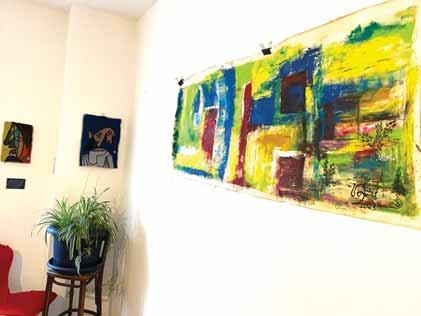
mysterious plants, abandoned dreamy urban structures and rocky surroundings reminiscent of the surrealists‘ visions and painting style. The female figure in the foreground, probably the spirit itself, ushers the spectators into the imaginary worlds rendered on her canvases.
Painter Nino Kurashvili, a former student of world famous artist Friedensreich Hundertwasser, is represented by two works ‘Fish’ and ‘Cosmo Woman.’
The shimmering gold-covered surface of her paintings appears enigmatic. The dark contours of the female figure with a helm stands out as if performing a ritual dance movement. Her dark profile accentuated by the hand pressed to her forehead shows the flow of the moment and the state of meditation. The golden fish, on the other hand, against the dark background, evokes fairy tale motives from folklore and legends, calling into memory the supernatural powers invested in animal totems and christian symbols.
In times of crisis and political instabil-
ity, many artists opt to escape into the surreal worlds of phantasies and blissful contemplation. Others decide to interpret reality in their artistic practice in the form of political activism, some artists making use of politically charged symbols in their works that bring their message across to the viewers better than words. Art is a medium that appeals to human emotions in the first place, to our hearts rather than to our minds, standing above political agendas and ambitions. Artists are free to choose between creating overtly political content or seeking inspiration from other topics. The idea of this exhibition was to document current artistic trends in the contemporary Georgian scene and design. The exhibition of Georgian artists at the Volkssolidarität Berlin is curated by Lily Fürstenow. Due to the increasing interest of the viewers, it has been extended till June 30, 2024. More information is available online on the virtual art platform: www.emergingartists.art

FROM GEORGIAN INTO ENGLISH BY
Mr. Jansugh Charkviani was born in 1931, and passed away in 2017. He is renowned as a Georgian poet and was actively involved in the Parliament of Georgia from 1992 to 2004. Hailing from Tbilisi, Charkviani completed his education at Tbilisi State University in 1953. His literary journey began with the publication of his initial poems in 1947. Throughout the 1960s to the 1990s, he served as an editor for various literary magazines. His contributions to
literature earned him prestigious awards, including the Shota Rustaveli Prize in 1984 and Georgia's Order of Honor. He had the distinction of being named an Honorary Citizen of Tbilisi in 1996. Let me bring Water to the thirsty, Debt to the debtor, Teach the ways For the lost, Make me spray
The unsprayed vine, Elsewhere buried My brothers find, Let my bones be Buried in my home And let me say: It was worth living And I'll go with you Wherever you want.
Fine-art photography is something more than regular photoeffort, and is a genre that is highly developed in this country. In the last 100 years Sakartvelo has given the world tens of names in the field that have gone down in the history with the mark of their genuine professionalism, and is one of them, whose black-and-white portraits were recently on display at the exhibition hall of the Georgian Academy of Arts, a magical show of old and new works preserved in his vast portfolio. Literally each portrait of that impressive indoor vernissage is marked with the photographer’s individual aesthetic quality and imaginative faculty, each piece going beyond plain camera mastery to perpetuate the captured image in the mind of the spectator with incisive sharpness. Mechitov talks to us through those images, as if he is rewriting human history in painfully memorable facial expressions to forever leave an indelible impression in the minds of those who found time to go to the event.
Yuri will be 75 next year. Oddly enough, he was trained as a mining engineer, but photo-art is what has infatuated his inquisitive personality beyond the imagination of anybody around him, including his family members. Little Yuri started shooting when he was hardly eight. He
A
began exhibiting his photo-material as early as 1979, and today boasts having almost 100 authorized exhibitions under his belt. Mechitov’s artistic biography accounts for several documentaries and roles in some feature films. He was lucky enough to have worked with Sergei Parajanov, an outstanding film director of soviet times. He has written books and lectured for university students, and even functioned as Deputy Minister of Culture of Georgia, but I am not surprised – after all, the great Goethe himself used to be a finance minister!
The latest exhibition we are talking about was opened in the presence of a huge crowd. The curiosity of further attendants lasted for about a fortnight, which is quite an indicator in today’s busy world. Among the photo-exhibits, there were many famous faces, thus building the amazingly vivid photo-annals of Sakartvelo. Some of the personalities reflected in Mechitov’s works are no longer among us, but the author has perpetuated their memorable images as if writing them in stone. Writes Maia Deisadze, who has specialized in interpreting, evaluating and promoting Mechitov’s prolific legacy: “Outstanding photoartist, peerless portraitist, and not just that . . . my closest friend and guru; his art is versatile; he is our nation’s genuine chronicler; his love for fellow-humans knows no limits, and this is clearly felt in all his masterpieces.”
But nobody can be more precise than Mechitov himself in describing his cre-
ative sense: “I have tried a variety of photographic genres, and was not unsuccessful. And yet, the genre closest to me is portraiture. This is an image of a man/ woman who, alone in the entire animal world, knows for sure that he/she is mortal. This knowledge is especially evident when photographing very old or terminally ill people who are already aware of their imminent end. They think, not without reason, that this may be their last photographic image.”
Yuri Mechitov is always in the public eye, and the public in his eye, never missing a chance to freeze in time and digitalize the most attractive and shocking moments of our lives, especially the faces of our compatriots, this, in most cases, happening accidentally; the creative grandmaster’s spontaneity always clear, present and poised. Incidentally, judging by his childlike nature, when I see him at work, I can’t help throwing my imagination back into his childhood, thinking that he is still there, only with a somewhat honed sense of picture and seriously matured possession of the camera's technical eye. On top of all that, Yuri Mechitov is a well-known public figure who the people never desist to talk about because he is always deeply in the swim of the most important matters of society. Aren’t we all lucky to have around a man who can do both – comment on current events and reflect the self-same proceedings in his artistic photo escapades? What an enduring service to the country!
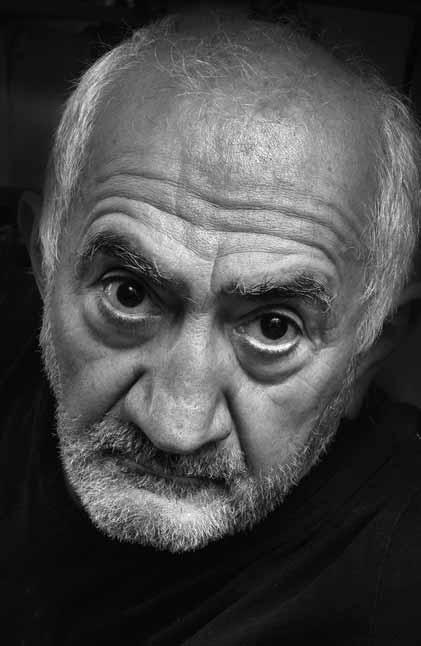
The Pedro Martins Group opened the Joseph Lagidze International Arts Festival 'Tbilisi Rhythm' at the Vakhtang Salaridze Concert Hall last week, marking their first-ever performance in Tbilisi. Comprising multi-instrumentalist and vocalist Pedro Martins, bassist Michael Pipoquinha, pianist Felipe Viegas, and drummer Renato Galvão, the ensemble showcases a rich tapestry of sounds that reflect both their cultural heritage and innovative spirits. Their music is a seamless blend of jazz improvisation, Brazilian rhythms, and modern fusion, creating a unique and compelling sonic experience.
Pedro Martins, often hailed as a “multidimensional” musician, stands at the forefront of the group with his remarkable versatility. His skills span guitar, vocals, and other instruments, allowing him to lead the ensemble with a broad artistic vision. Martins’ guitar work is characterized by its lyrical quality, intricate harmonies, and rhythmic complexity. His approach often incorporates the rich, melodic lines typical of Brazilian music, seamlessly merging them with the harmonic sophistication and improvisational nature of jazz.
Vocally, Martins employs a soft, expressive style that complements his instrumental prowess. His singing often fea-
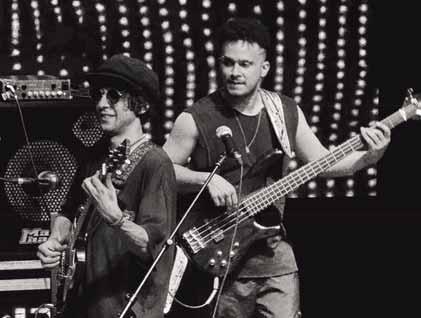
tures the smooth, rhythmic phrasing found in bossa nova and samba, bringing a distinctly Brazilian warmth to the group’s sound. This dual capability as a guitarist and vocalist enables Martins to navigate and blend multiple musical textures, contributing to the group's multidimensional character.
Michael Pipoquinha, a prodigious talent on the bass guitar, infuses the group’s music with a deep, resonant foundation. His playing is marked by technical precision, melodic inventiveness, and rhyth-
PUBLISHER & GM George Sharashidze
COMMERCIAL
DEPARTMENT
Commercial Director: Iva Merabishvili
Marketing Manager: Natalia Chikvaidze
EDITORIAL DEPARTMENT:
Editor-In-Chief: Katie Ruth Davies
mic dynamism. Pipoquinha’s style is heavily influenced by Brazilian music traditions, particularly the grooves of samba and baião, which he effortlessly integrates into the complex harmonic structures of jazz. His ability to shift between supportive grooves and intricate solos adds a layer of depth to the ensemble's sound. Pipoquinha’s bass lines often serve as a bridge between the rhythmic and harmonic elements of the group, grounding the music while allowing it to soar.
Journalists: Ana Dumbadze, Vazha Tavberidze, Tony Hanmer, Nugzar B. Ruhadze, Mariam Mtivlishvili, Erekle Poladishvili, Shelbi R. Ankiewicz
Photographer: Aleksei Serov
Felipe Viegas brings a rich harmonic palette to the Pedro Martins Group with his sophisticated piano work. His playing is characterized by its fluidity, harmonic richness, and rhythmic agility. Viegas draws from a broad range of influences, from the classical traditions of European music to the syncopated rhythms of Brazilian choro and samba.
In the context of the group, Viegas often serves as the harmonic anchor, providing lush chordal textures and intricate voicings that enhance the melodic lines of Martins and the rhythmic foundations laid by Pipoquinha and Galvão. His solos are a blend of lyrical expressiveness and technical brilliance, often exploring complex harmonic territories while maintaining a clear, melodic focus.
Drummer Renato Galvão completes the ensemble with his dynamic and versatile drumming. Galvão’s style is deeply rooted in Brazilian rhythmic traditions, from the driving beats of samba to the intricate patterns of maracatu and frevo. His drumming is characterized by its precision, creativity, and ability to navigate complex rhythmic structures.
Galvão’s role in the group extends beyond keeping time; he is a rhythmic architect, crafting grooves and textures that propel the music forward. His interplay with Pipoquinha creates a powerful rhythmic foundation, while his interactions with Martins and Viegas add a dynamic and conversational element to the music.
The Pedro Martins Group stands out for its ability to fuse Brazilian musical traditions with the improvisational and harmonic complexity of jazz. Their music reflects a deep respect for their cultural roots while also pushing the boundaries of contemporary jazz. This fusion is evident in their compositions, which often feature syncopated rhythms, rich harmonies, and expansive improvisations. Their performance at the Tbilisi Rhythm Festival was marked by a high level of interplay and communication among the members. This collaborative approach allows the group to explore a wide range of musical landscapes, from intimate, lyrical passages to high-energy, rhythmic explorations.
The Tbilisi Rhythm Festival, also known as the Joseph Lagidze International Arts Festival, is a renowned event that celebrates the rich tapestry of rhythmic music from around the world. Founded to honor the legacy of Joseph Lagidze, a prominent figure in Georgian music, the festival aims to foster cultural exchange and showcase diverse musical traditions. The mission of the festival is to highlight the importance of rhythm in music, and its ability to transcend cultural boundaries. By featuring a diverse lineup of artists, the festival promotes a deeper understanding and appreciation of the various rhythmic traditions that exist globally. The festival's emphasis on rhythm and innovation provided the perfect backdrop for the group's blend of Brazilian and jazz influences.
Website Editor: Katie Ruth Davies
Layout: Misha Mchedlishvili
Webmaster: Sergey Gevenov
Circulation Managers: David Kerdikashvili, David Djandjgava
ADDRESS
1 Melikishvili Str. Tbilisi, 0179, Georgia
Tel.: +995 32 229 59 19 E: info@georgiatoday.ge F: GeorgiaToday
ADVERTISING & SUBSCRIPTION
+995 555 00 14 46
E-mail: marketing@georgiatoday.ge
Reproducing material, photos and advertisements without prior editorial permission is strictly forbidden. The author is responsible for all material. Rights of authors are preserved. The newspaper is registered in Mtatsminda district court.
Reg. # 06/4-309
